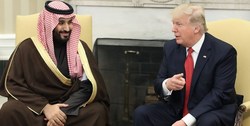 Saudi Arabia’s expanding nuclear and missile programs raised fears that it aims to acquire nuclear weapons, with analysts warning that a nuclear Riyadh under its “reckless” leadership would pose a threat to the countries in the region.
Saudi Arabia’s expanding nuclear and missile programs raised fears that it aims to acquire nuclear weapons, with analysts warning that a nuclear Riyadh under its “reckless” leadership would pose a threat to the countries in the region. RNA - “The small quantities protocol was designed to simplify safeguards for states with minimal or no nuclear material, but it is no longer adequate for Saudi Arabia's expanding nuclear program,” Kelsey Davenport, director of Nonproliferation Policy at Arms Control Association, told Middle East Eye (MEE).
Saudi Arabia, a signatory of the nuclear Non-Proliferation Treaty (NPT), signed in 2005 a so-called small quantities protocol with the International Atomic Energy Agency, which exempts countries with no or minimal nuclear programs from inspections. Riyadh, which is constructing a nuclear reactor, has so far resisted calls by the IAEA to implement proportionate safeguards and an inspection regime that would prohibit possible deviation towards weaponization.
Referring to Saudi Arabia’s threats to pursue nuclear weapons, its exemption from inspections and its developing ballistic missile program, Davenport stated, “There are legitimate reasons to be concerned that Saudi Arabia is seeking to develop the technical capabilities that would allow Riyadh to quickly pursue nuclear weapons if the political decision were made to do so."
Saudi Crown Prince Mohammad bin Salman, who enjoy strong support from US President Donald Trump, stated last year that his country would promptly acquire nuclear weapons if Iran does.
Iran has warned that it has noticed some of its neighbors with a “proven black record of supporting terrorist movements” working on “suspicious nuclear projects”, which would force Tehran to revise its defense strategy.
According to a report by MEE, Saudi Arabia's nuclear and missile programs are bound to have significant regional implications.
Earlier this month, Democratic US Senator Tim Kaine revealed that the Trump administration had approved the transfer of nuclear know-how to the kingdom seven times, twice after the Riyadh regime's killing of Saudi dissident journalist Jamal Khashoggi inside the Saudi consulate in Istanbul in early October 2018.
The money-driven politics of the American president have raised doubts about Washington's resolve, or even ability, to keep possible Saudi nuclear ambitions in check.
The Trump’s administration approved six authorizations that allow American companies to secretly provide Saudi Arabia with nuclear technology or technical assistance, revealed a document issued by the Department of Energy and seen by Reuters in late March.
Simultaneously, Saudi Arabia has reportedly stepped up its ballistic missile program with the help of China.
"Saudi Arabia's development of ballistic missiles goes against long-standing US policy of opposing missile proliferation in the region," said Nicholas L. Miller, professor of government at Dartmouth College, adding, "But the Trump administration has so far been relatively quiet about its response."
"There seems to be a pattern in this administration of looking the other way at provocative Saudi behavior due to the laser-like focus on Iran," Miller argued.
According to Fars News Agancy, Saudi Arabia’s concurrent and mostly clandestine missile and nuclear activities combined with MbS' warnings that the kingdom would pursue atomic weapons are also sounding alarm bells in certain regional capitals.
"A nuclear Saudi Arabia means nuclear proliferation in the most unstable and volatile region of the world," Ali Bakeer, a Turkey-based political analyst, told the online news outlet.
"Given the reckless leadership in Riyadh, this is an alarming development for small states in the [Persian] Gulf in particular, which might either seek a nuclear umbrella from great powers or consider constructing parallel deterrence capabilities of their own if they could afford it," he added.
Qatar is one of those countries that has feared an invasion by Riyadh. US officials declared that Saudi Arabia was planning to invade Qatar and seize its North Dome gas field, before its imposition of an all-out diplomatic and economic boycott on the nation in June 2017.
847/940